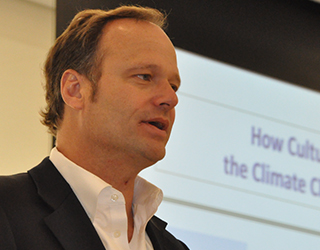Scott Wentzell | October 23, 2015
 Much like day one of the Energy Solutions Exchange, day two didn’t disappoint. Before I head off to join the attendees on our brewery tour, I wanted to share three final takeaways from today’s Energy Solutions Exchange:
Much like day one of the Energy Solutions Exchange, day two didn’t disappoint. Before I head off to join the attendees on our brewery tour, I wanted to share three final takeaways from today’s Energy Solutions Exchange:
1. Energy management and action on climate change are inherently pre-competitive behaviors; partnerships are the key to unlock knowledge sharing on both
Unlike many issues where collaboration would be detrimental to competitive companies, energy management and action on climate change benefit from multiple parties at the table. When traditional competitors Nestle and Mars formed a united front with other food companies to sign and circulate Ceres’ joint letter to U.S. and world leaders, it really drove home the fact that climate change is a pre-competitive issue as it puts each company’s ingredient supply chain at risk. On energy management, it was incredibly gratifying to see the power of our network bring together different companies to share their progress, tactics and barriers. These conversations have armed our network with critical insights and has opened the door to further conversations.
2. Corporate disclosure and goal setting can help change the broader climate change conversation
Corporate disclosure and goals are becoming more and more commonplace, which is motivating additional companies to speak publically and set goals of their own. This momentum is going a long way towards changing the broader climate conversation. As Anne Kelly from Ceres noted “policy is a lagging indicator” and we should instead look to corporate actions to lead the way. Just think – a few years ago, renewables were a non-starter, a pricey alternative to traditional energy methods. Today, more and more companies are looking to use 100 percent renewables in the near future. One way I would love to see companies build on their renewables commitments is to clearly align their renewable goals with the broader climate conversation to help people make the connection between a solid business decision and mitigating climate change.
3. Political winds are changing, and the key is to align the right messages with the right messengers
If anything raised my spirits today, it was the consensus among all our speakers that the political winds are changing. Increasingly, government officials on both sides of the aisles are reevaluating and evolving their positions on climate change. But the key to continuing the momentum is matching the right message with the right messenger. Too often we expect people to be swayed by the scientific data, when in reality, politicians and the average American are far more interested in hearing from those they trust (who, spoiler alert, are not scientists or Al Gore). As many Americans and politicians find business trustworthy – having more and more companies speak out about the need to tackle climate change and the effects of it on their business is crucial if we are going to continue tackling this issue.
Hope you enjoyed my recap blogs! To see more from our Energy Solutions Exchange, follow @EDFbiz and the event hashtag #ESEBoston15 for further insights!
About EDF Climate Corps
EDF Climate Corps (edfclimatecorps.org) taps the talents of tomorrow’s leaders to save energy, money and the environment by placing specially trained EDF fellows in companies, cities and universities as dedicated energy problem solvers. Working with hundreds of leading organizations, EDF Climate Corps has uncovered nearly $1.4 billion in energy savings. For more information, visit edfclimatecorps.org. Read our blog at edfclimatecorps.org/blog. Follow us on Twitter at twitter.com/edfbiz and on Facebook at facebook.com/EDFClimateCorps.